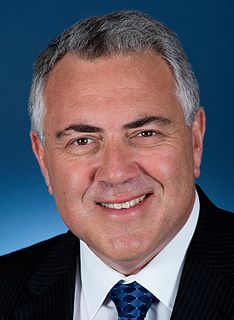A Quote by Joe Hockey
Fiscal policy, monetary policy, they need to work together to try and raise the level of growth.
Quote Topics
Related Quotes
Inflation is certainly low and stable and, measured in unemployment and labour-market slack, the economy has made a lot of progress. The pace of growth is disappointingly slow, mostly because productivity growth has been very slow, which is not really something amenable to monetary policy. It comes from changes in technology, changes in worker skills and a variety of other things, but not monetary policy, in particular.
I think the ethos for Gov. Romney is to use a whole variety of policies, of which tax policy is one, to try to raise the rate of growth. We've had a recovery from the financial crisis that would be well below what one might normally expect for a recovery from such a deep recession. And to counteract that we need better tax policy.
I'm not trying to be diplomatic. I'm trying to be more nuanced and realistic. I think there has to be a serious examination of the shortcomings of the Euro structure. Euro central institutions, whether it be fiscal policy, monetary policy, financial regulation, are simply not as robust as they are in a currency that has a national government behind it.




























